Click to Skip Ahead
It can be pretty scary if your cat develops facial swelling, regardless of whether it is sudden. The first thing that comes to most of our minds is, “Is it cancer?” Let’s look at some possible causes of facial swelling in cats. Don’t worry because it’s not always cancer.

Does a Cat With a Swollen Face Have Cancer?
If you find a lump on your cat’s cheek or notice your cat has a swollen whisker area, it’s easy to jump to a worst-case scenario, and cancer is one of the top differential diagnoses. Cats can develop oral masses or cancers on their face. The most common type is squamous cell carcinoma, which arises from cells lining the mouth or around the tongue. Some cats can have lymphoma and develop edema or facial swelling because the lymphatic system can’t drain adequately.
It’s not the only thing it could be, though.

The 5 Other Potential Causes of Your Cat’s Swollen Face
As mentioned before, cancer could be just one of the reasons why your cat has a swollen face, so you do not want to jump to the worst-case scenario. Your vet will examine a few potential causes of your cat’s swollen face, as listed below:
1. Periodontal Disease and Abscesses
Another common condition that can result in what looks like a tumor on your cat’s face is tooth root abscesses. An estimated 50% to 90% of adult cats suffer from periodontal disease.1 Sometimes, bacteria will enter a tooth fracture or migrate along a tooth root and cause an abscess. Your cat can develop a swelling on its face, which sometimes bursts open and drains. The typical location for this swelling is under the eye around the maxilla.
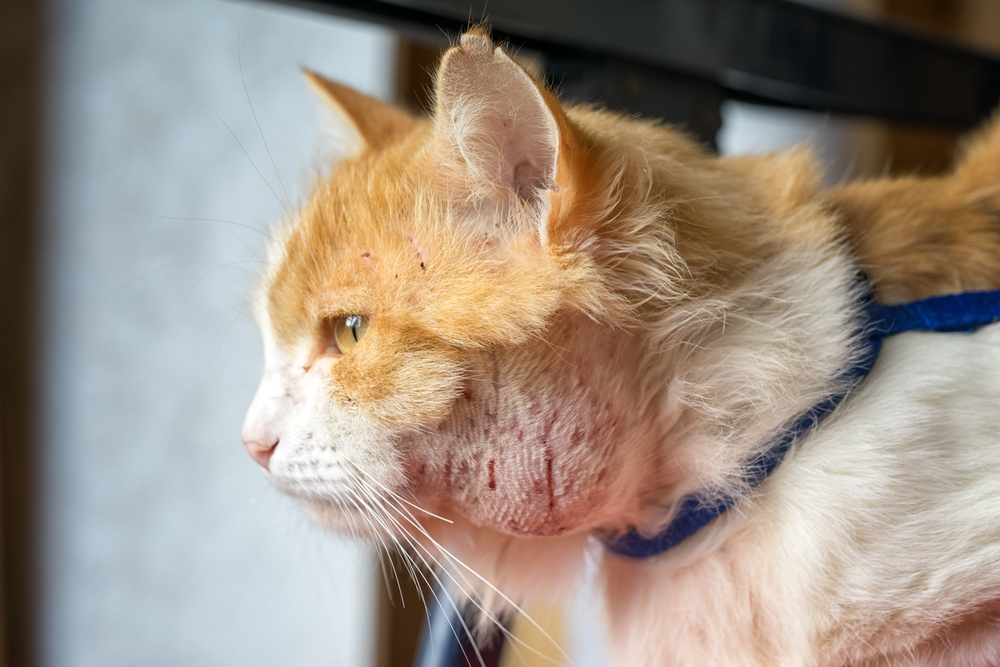
2. Insect Bites or Stings
Cats love to hunt, and unfortunately, they sometimes hunt bugs. Your cat could get a bee sting, spider bite, or other insect injury. As part of the body’s inflammatory response, they might get a swelling or even an open sore.
3. Allergic Reactions
Your cat could develop an allergic reaction to a sting, vaccine, or other allergen. Some cats will get very itchy, while others may have watery eyes. Your cat could have a small bump, or its whole face could swell as part of an anaphylaxis response.

4. Eosinophilic Granuloma Complex
Eosinophilic granulomas can occur in several places on your cat’s body, including their face. These lesions often occur around the lip, which your vet might call a rodent ulcer. The tissue can become very inflamed and even erode.
5. Cysts
Some cats will develop cysts on their face. Cells can start to secrete fluid, which can lead to swelling. Cysts are usually benign but can become quite large and impact surrounding tissue. Cats may start to rub or scratch at the cyst and cause it to become infected.
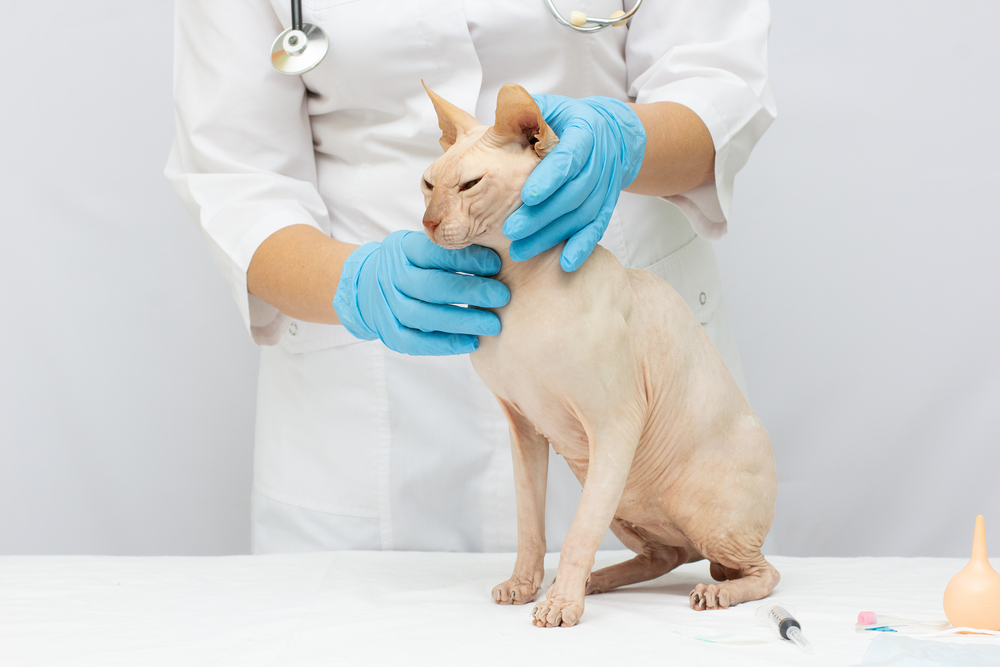

Diagnosing the Causes of Facial Swelling in Cats
You should schedule a veterinary appointment when you notice a swelling on your cat’s face. Your vet may suggest testing or an exam under sedation or anesthesia, depending on where it is and what it looks like.
The vet might want to take a cytology sample, where they stick a needle into the swelling to collect fluid or cells and either interpret it in the hospital or send it out to a pathologist for interpretation. They might also take a biopsy or tissue sample to submit to the pathologist for review.
Radiographs (X-rays) are a great diagnostic tool for looking for evidence of an abscess or changes that might affect the bone. Sometimes, your vet will refer you to a specialty center for more advanced imaging, such as a CT or MRI.
Your veterinarian may suggest blood work to check for evidence of inflammation or other metabolic changes. If they suspect cancer, they might suggest an ultrasound or radiographs (X-rays) to look for internal changes or cancer spread.
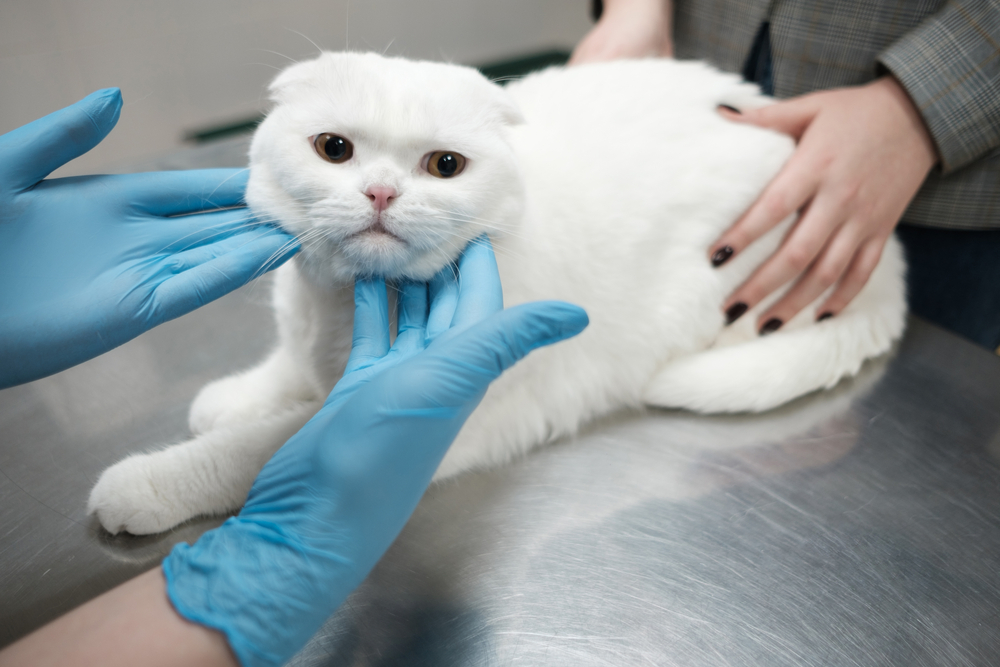
Treating Your Cat’s Facial Swelling
The treatment of facial swelling in cats depends on the underlying cause. Some masses will need to be surgically removed, but if there’s a tooth root abscess, the best treatment is to remove the infected tooth.
Your cat might need chemotherapy or radiation therapy for certain cancers. If it’s just an inflammatory response, your veterinarian could suggest steroids, anti-inflammatory medications, and antibiotics if there’s evidence of infection.
Preventing Facial Swelling in Cats
There’s no definitive way to prevent your cat from developing facial swelling. Dental care can reduce the odds of your kitty getting a tooth root abscess, but it doesn’t eliminate the risk entirely.
Consider keeping your cat indoors to reduce the risk of exposure to insects that might bite or sting your feline family member.
If you notice any changes in your cat, have them evaluated by a veterinarian as soon as possible to try and intervene in the early stages of the mass or inflammatory process.
If you need to speak with a vet but can't get to one, head over to PangoVet. It's an online service where you can talk to a vet online and get the advice you need for your pet — all at an affordable price!

Frequently Asked Questions (FAQ)
How do cats act when they have cancer?
Cats can have different signs of cancer, depending on the body systems affected. For instance, with cancer in the lungs, your cat might cough or have trouble breathing.
- Lethargy
- Inappetence
- Weight loss
- Vomiting
- Coughing
- Respiratory distress
- Non-healing wounds
- Lumps
- Pain
What does cancerous growth look like on a cat?
There’s no one-size-fits-all approach to cancers. Your cat could have a small lump that doesn’t seem to cause any trouble and looks like a skin tag, and it could be a metastatic lesion. Some cancers will become ulcerated or will erode some of the healthy tissue. Especially when masses get very large, they can have a necrotic or non-healing region.
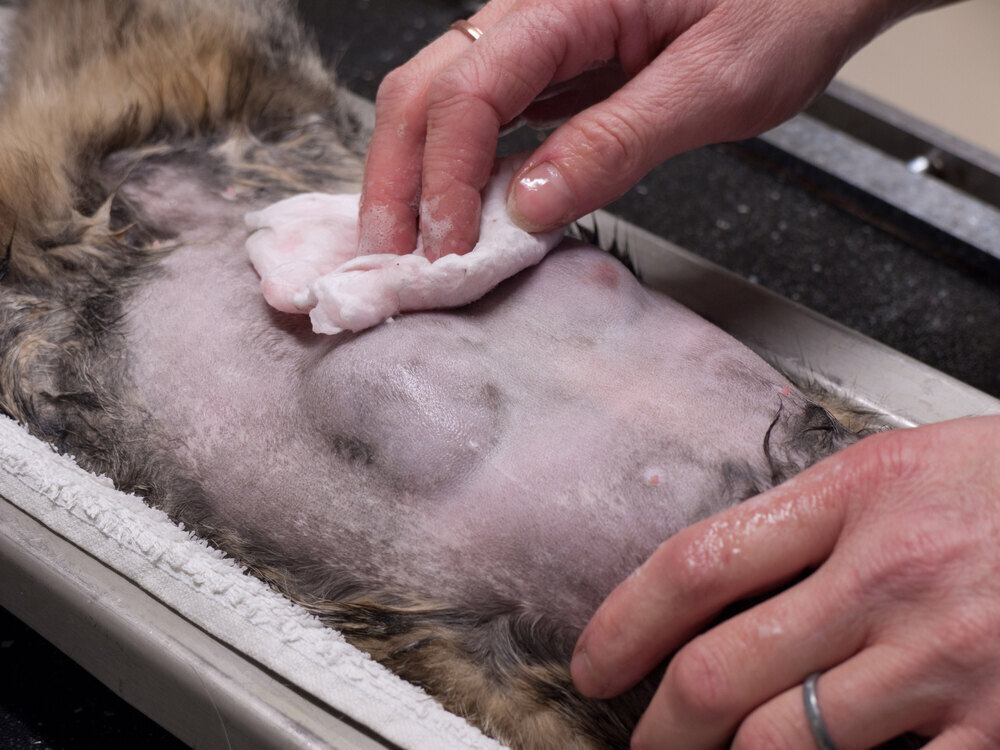

Conclusion
Like us, our cats can develop a variety of potential facial swellings. While some are cancer, others might be evidence of an infection. Your vet will help you determine the underlying cause to formulate a solid treatment plan.
See Also:
- Why Is My Cat Jaw Swollen After Dental Work? Vet-Approved Common Causes & Recovery Tips
- Sudden Cat Face Swelling: Causes, Treatments & FAQ (Vet Answer)
Featured Image Credit: Elena11, Shutterstock

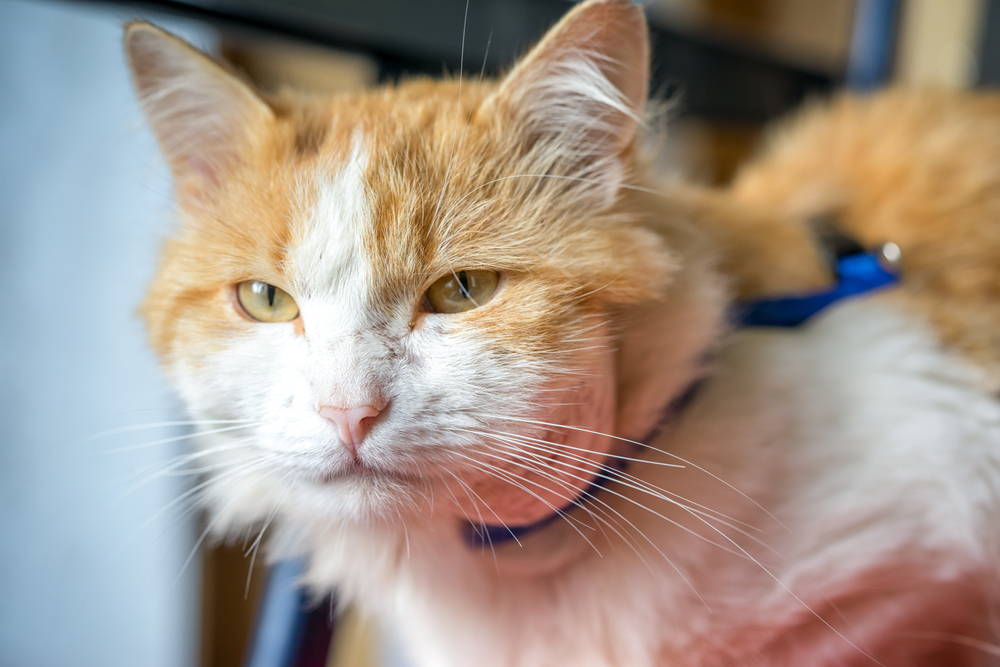


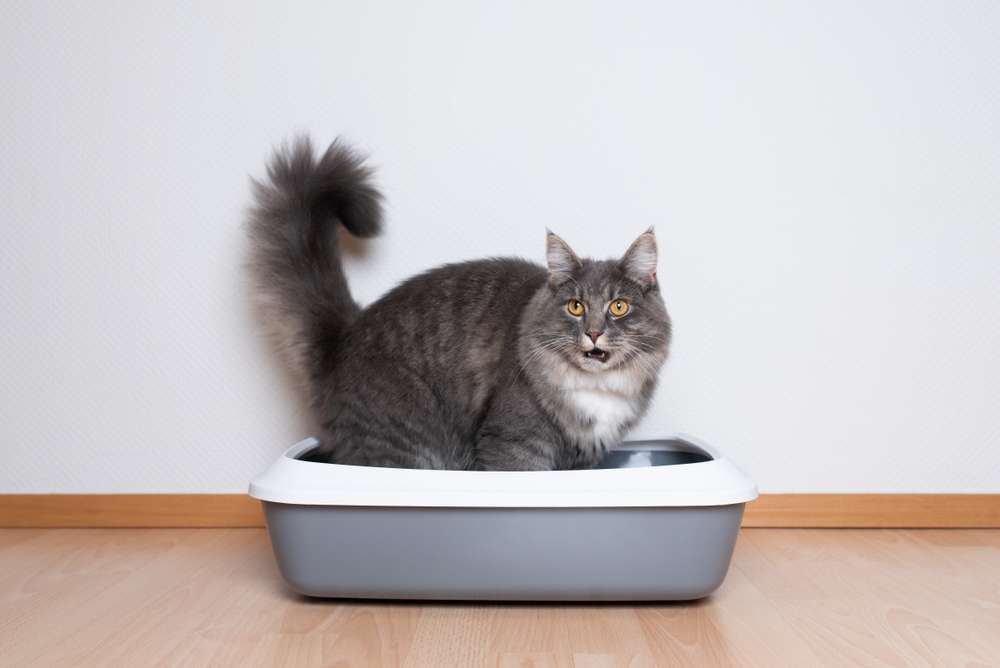




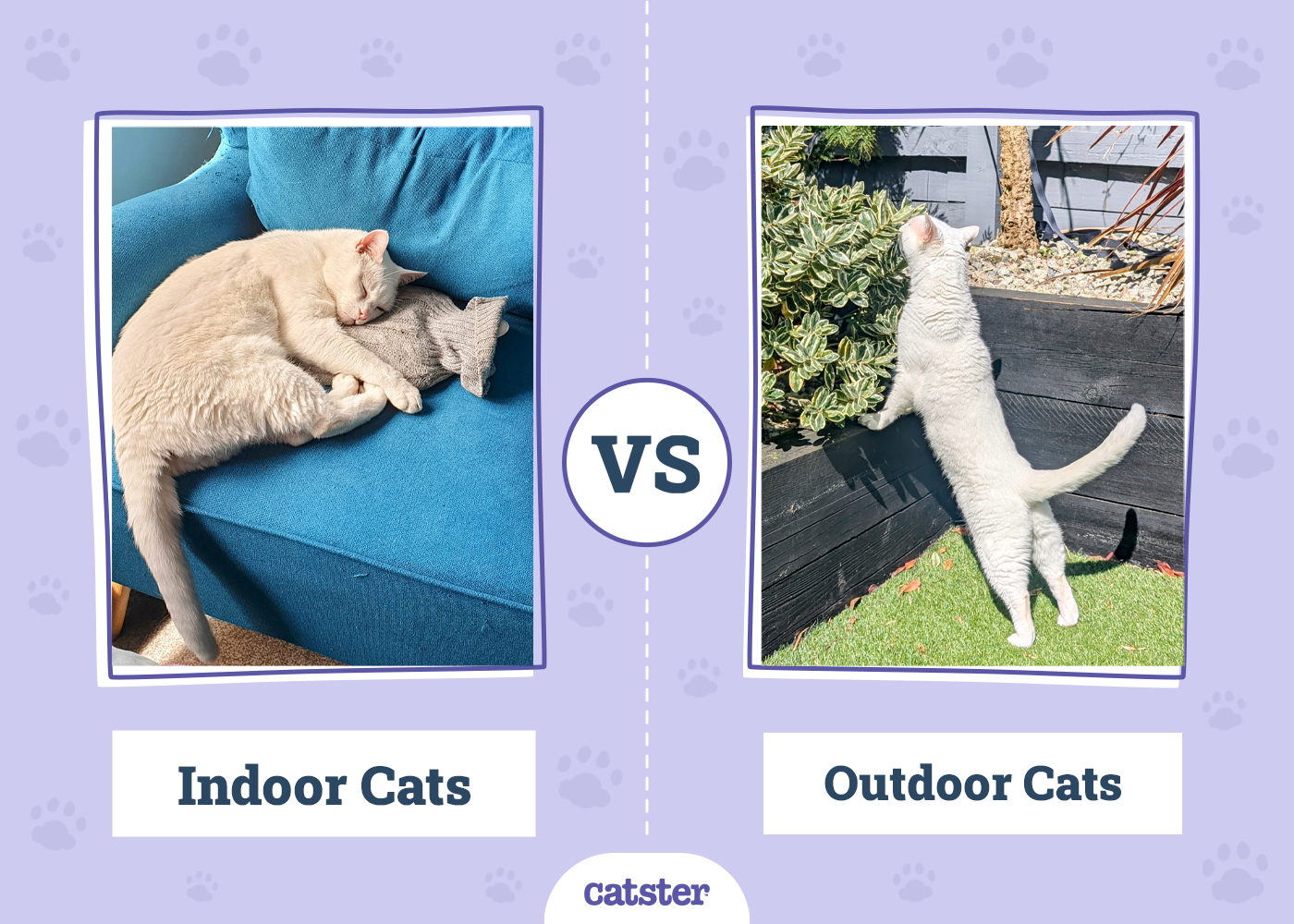


my cat is 15 years old she is spayed. She has been a very healthy cat never had to take her to the vet, she does not go out much only for a few minutes to smell the flowers, then comes back inside if no one is outside with her. I recently notice a lump on her lower left cheek and I thought it was just a bruise where my other cat might of hit her. Its been a few days and I noticed the lump started getting bigger, I touch her face and my cat doesn't seem bothered by it, she is eating at her usual times well. My cat only sleeps on her belly on the side she doesn't have the lump. I am concern it might affect her breathing before I can get her to the vet on this Thursday since I will be going out of town.
Hi Osiris, it sounds like you do a wonderful job of taking care of your girl. It's good to hear she is not too bothered by the lump, but your instincts are probably correct in saying that you should get it checked out by a veterinarian just for peace of mind. If you can't make it to the vet clinic before you head out of town, we actually have an online veterinarian service, https://pangovet.com/ where you can have a video consult with an experienced veterinarian from the comfort of your home. They will take a look at your cat and help you come up with a plan if necessary. Hope this helps!